A Tragic Anti-War Interpretation of Euripides’ Iphigenia Among the Taurians
Abstract
A far away and strange land, a story surrounded by mystery, and a great and perfect happy ending have been considered by most scholars as a proof for the following point: Iphigenia among the Taurians is not a real tragedy. This paper focuses on demonstrating the opposite. It is generally acknowledged that we are faced with an evasive melodrama, almost novel on stage, which shows us how Euripides was just trying to create good entertainment for his audience, forgetting the main objective in Greek tragedy, overlooking the wish to show a universal truth through the symbol within the myth. However, we suggest that an in-depth study of the resources used by Euripides, as well as a new reading, free from pre-conceived ideas, can reveal some really tragic elements inside the story, a spectacle full of phóbos, éleos and kátharsis: and a deep, painful, woeful message, screaming against the Peloponnesian War. Thus, we aim for a revision of Euripidean theatre, which is more human and less scientific, more closely related to its historical context and a somewhat less bound to modern preconceptions and analyses.Downloads
-
Abstract547
-
PDF (Español (España))295
Las obras que se publican en esta revista están sujetas a los siguientes términos:
1. El Servicio de Publicaciones de la Universidad de Murcia (la editorial) conserva los derechos patrimoniales (copyright) de las obras publicadas, y favorece y permite la reutilización de las mismas bajo la licencia de uso indicada en el punto 2.
2. Las obras se publican en la edición electrónica de la revista bajo una licencia Creative Commons Reconocimiento-NoComercial-SinObraDerivada 3.0 España (texto legal). Se pueden copiar, usar, difundir, transmitir y exponer públicamente, siempre que: i) se cite la autoría y la fuente original de su publicación (revista, editorial y URL de la obra); ii) no se usen para fines comerciales; iii) se mencione la existencia y especificaciones de esta licencia de uso.
3. Condiciones de auto-archivo. Se permite y se anima a los autores a difundir electrónicamente las versiones pre-print (versión antes de ser evaluada) y/o post-print (versión evaluada y aceptada para su publicación) de sus obras antes de su publicación, ya que favorece su circulación y difusión más temprana y con ello un posible aumento en su citación y alcance entre la comunidad académica. Color RoMEO: verde.






